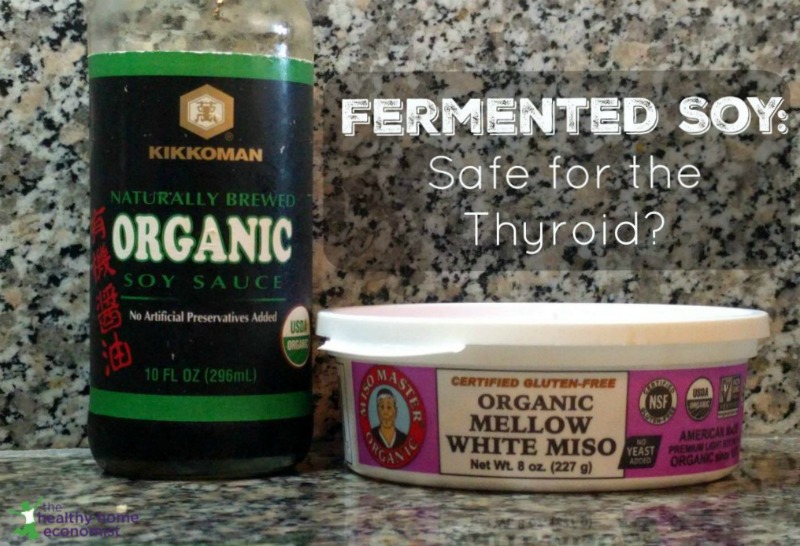
A huge misconception in the health community is that fermented soy is safe to eat for those with thyroid issues. This would include traditional foods such as miso (either light or dark), tempeh, natto, and naturally brewed soy sauce.
Note that most forms of tofu are not fermented and hence, are not included in this discussion. Neither are edamame beans or soyamilk.
Even leaders in the healthfood community commonly believe that fermenting soy as traditionally practiced in Asia not only breaks down the anti-nutrients, such as phytates, but also the isoflavones (plant hormones). These isoflavones are the goitrogens that can reduce thyroid function.
Isoflavones (Goitrogens) in Fermented Soy
While it is true that fermented soy is the only safe way to consume soy as the anti-nutrients are significantly reduced, unfortunately, it is still very much goitrogenic (thyroid suppressing).
In fact, fermentation actually increases the bioavailability of the goitrogens!
As mentioned above, the isoflavones in soy ARE the goitrogens. They are not reduced by fermentation, they are enhanced. This is why Asian cultures took great care to eat fermented soy foods in small condimental amounts. Celibate Buddhist monks ate them in larger quantities as they helped reduce libido and reproductive capacity.
According to the research of Dr. Chris Masterjohn, fermentation frees the isoflavones (goitrogens) from the sugars to which they are conjoined.
When a person eats unfermented soy such as bean curd, green baby soybeans, or the plethora of processed soyfoods on the market like soy milk, there is little digestive action in the human intestines to free the isoflavones from these sugars. However, when this bond is broken during fermentation via the action of the fermenting bacteria, this paves the way for much greater absorption of the isoflavones when a person consumes fermented soy!
Note that soya lecithin contains no isoflavones, so it is safe when nonGMO and in small amounts.
Have I thoroughly confused you?
I hope not. Let’s go a step further…
Fermentation Improves Digestibility
Why is fermented soy better, then?
The real reason is that the fermentation process effectively breaks down the very high levels of phytic acid and other anti-nutrients like lectins.
This permits ease of nutrient absorption during the digestive process.
Note that soy anti-nutrients can also harm the pancreas. Fermentation prevents this damaging effect.
Cultured Soy Contains Vitamin K2
In addition, cultured soy adds the MK-7 form of Vitamin K2.
According to the Weston A. Price Foundation, Vitamin K2 is the mysterious “X-Factor” referred to in the writings of Dr. Weston A. Price. This nutrient supercharges mineral absorption by the body and is very effective at preventing and repairing tooth decay.
Fermentation, then, is a double-edged sword when it comes to soy. The process transforms soy into a nutrient-dense food but actually increases the hormone-disrupting effects of the plant isoflavones (goitrogens).
Should You Avoid Fermented Soy?
What to do? Is fermented soy out of the question too?
Absolutely not!
Fermented soy is a nutrient-dense food that is a fantastic addition to the diet with one caveat. Fermented soy must be consumed within the context of an iodine-rich diet.
Therefore, if you eat the typical American low-fat diet which is incredibly devoid of foods containing thyroid protecting iodine and then suddenly decide to go wild eating fermented soy all the time because you saw something positive about it on the evening news…this could pose a problem for your thyroid health!
Eating Fermented Soya Safely
Before you add fermented soy to your menu, check that the following are true for your situation.
First, check with your doctor if you already suffer from thyroid disease. In my opinion, those with thyroid issues should just avoid soy, period.
If your thyroid is in good shape, be sure to consume only small amounts of natto, miso, tempeh, or traditional soy sauce as a part of an ancestral diet. Your regular menu should include plenty of iodine-rich foods such as deep yellow butter or grass-fed ghee.
In this manner, you can enjoy the wondrous K2-loaded health benefits of fermented soy with no downside from the thyroid-suppressing isoflavones!







can anyone comment on how much kelp is safe to ingest if hashi,hypo thyroid,iodine in bloodwork low but in range, urine iodine test high but not real high? Iv’e read half teaspoon is enough at almost 150mcg, the daily recommended amount? I agree that a plant based diet is the best at this point in evolution as we have so many plant foods available. Thank you very much for any feedback!
What about fermented soy in Radiant Life’s women’s multi vitamin. Are the vitamins safe to consume?
Hi there Tamara, if you need a supplement vetted, please use the purple chatbox to reach out to Sarah directly. You can sign up to use it here: https://www.thehealthyhomeeconomist.com/healthy-home-plus/ Thanks! Nicole